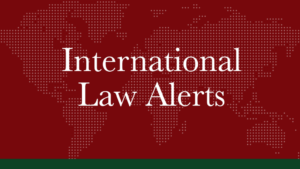
Climate change is an existential threat for people and the planet. Its harmful effects undermine the full enjoyment and realization of all human rights. Yet, no dedicated mechanism at the Human Rights Council addresses climate change holistically.
Our analysis focuses on the global policy aspects of the Strategy, laying out the EU’s commitments toward global chemicals management and detailing practical steps to achieve these commitments over the next few years. They include:
Washington, DC — In the wake of the attack on the United States Congress, CIEL President Muffett issued a statement.
Conflicts and military activities are major sources of pollution, including the long-term health and environmental risks caused by abandoned military detritus and explosive munition remnants. Clear removal and victim assistance obligations exist for certain explosive remnants, but until now a parallel framework for those affected by toxic remnants of war has been absent. A recent report entitled Confronting Conflict Pollution, seeks to address that gap.
On January 15, the Human Rights Council elected Fiji’s Ambassador Nazhat Shameem Khan as its President for 2021.
In a key decision paving the way for the creation of the long-awaited Naso Tjër Di Comarca, Panama’s highest court confirmed the State’s obligation to secure Indigenous collective rights to land and emphasized the critical role of Indigenous Peoples in protecting biodiversity, natural resources, and the climate.
WCEL is pleased to welcome Nicholas Bryner as the new WCEL Deputy Chair, and Christina Voigt and Christina Pak as WCEL Steering Committee Members.
The United Nations Environment Programme has released the UNEP Global Climate Litigation Report: 2020 Status Review. This critical report provides an overview of the current state of climate change litigation globally, as well as an assessment of global climate change litigation trends.







































































































 on the upper right corner to select a video.
on the upper right corner to select a video.